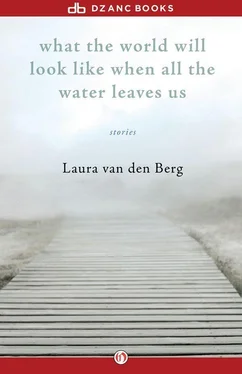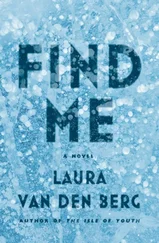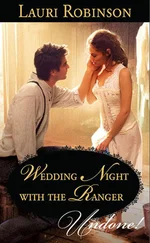“What will be done with the specimens you’ve collected?” Dale asked.
“They’ll be analyzed,” I replied. “And we’ll determine precisely what habitat the endangered plants require.” The chemical analysis was Peter’s specialty. Perhaps he was alone now, or maybe he and the woman had gone out for the evening. I took a long sip of wine and felt my face grow warm.
“I don’t understand your work.” Theodore didn’t speak directly to me, but addressed the group, his voice rising. “Where’s the science in preservation?” He leaned toward me, his chest nearly flat against the table. “Where’s the advancement?”
The other men were silent. To avoid provoking Theodore, I told myself, staring into my half-empty wine glass. All my training and experience, the multitude of ways I could illustrate the importance of my work, in those tensely quiet moments, vanished from my mind. I could only think of Peter and how his evening might be unfolding. Had they finished the movie by now? Were they preparing to leave for a restaurant, Anna Maria’s or Café Citron, or having a drink on the front steps of his new building? I couldn’t let go of the idea that Peter was simply transferring the customs we once shared to this new person, that within a few months the woman would grow into the very space I once occupied, as though I had never been there at all.
When I looked up, all the men, even McKay, were tilting forward, wide-eyed. I finished my wine in two gulps, then pressed my lips together, certain that by now all the color had been transferred to the rim of the glass.
I pushed back my chair and stood. Ian rose and began to say something, but I turned from the table and left the malt shop. I stepped onto the porch, where I sat on a wood bench and gazed into the Loch. The bench was next to a window and I heard the men’s voices, although I could not distinguish the words, only the alternately high and low pitches. I assumed they were talking about me.
The night was clearer than most and I was able to see stars, bunched together like handfuls of confetti. After nightfall, it was difficult to tell where the land disappeared into the water, but I could distinguish the boundaries of the Loch by the geography: perfectly smooth, a long sprawl of darkness.
I didn’t hear McKay approaching the porch, and only realized he was there when I looked up and found him standing next to the bench. He wore a denim jacket, the fabric thin around the collar and elbows. He sat next to me, crossed his legs and rested his hands on his knees.
“You shouldn’t listen to Theodore when he drinks,” he said.
I shrugged. “I suppose preservation isn’t the most exotic of the sciences.”
“It’s not so different from what I do,” he said. “This is just a job for the others, but not for me. I’ve spent a lot of my life looking.”
“Sarah told me about your search,” I said. “She said you were living by the lake when she first met you.”
McKay told me that one evening, many years ago, he saw the Loch Ness Monster footage Tim Dinsdale had shot in the sixties on a TV program. He said it was like a switch inside him was turned on, and he knew that the life he had been leading, the job at the IT firm and the fiancée, was over.
“After a month on the Loch, I ran out of food,” he said. “The Craigdarroch was the closet place to go for meals. I’m embarrassed to say that several months passed before I even noticed Sarah.”
“What finally got your attention?”
“She took me into her office one afternoon and showed me the photos that visitors to Loch Ness had taken of the monster over the years.” She had framed them and hung them on the walls, a little something for the tourists. She had all the famous ones, the pictures taken by Hugh Gray and Robert Wilson and Frank Searle, but she had several others that he had never seen before, images that were vaguer, capturing only dark blotches or hazy shapes in the water — but, to McKay, no less exciting.
“That day in her office, she took down all the photos and gave them to me,” McKay said. “She took them out of the frames one by one and put them in my hands. And I saw what I needed to see.”
I was reminded of something from my graduate school days. It concerned one of the professors, Dr. Edgevale, who spent much of her career studying Sebastopol Meadowfoam, a rare species found in the forests of Northern California. I shared with McKay the story Dr. Edgevale told me one afternoon, in her office overlooking the campus quad. It was about the first time, after months of searching, she located a stand of Sebastopol Meadowfoam, how she had stood in the forest clearing for the longest time, staring at her discovery in disbelief; the stand she’d located sprawled on for several feet, the flowers bright white, the short stems plump as green slugs. How her world, in an instant, became as simple and small as petals and stems and rough-edged leaves.
“She said it was like looking at her life through a microscope,” I told McKay. “The way everything blurred for a moment, then got sharp and distilled.”
“I know just the feeling,” he said.
“I wish I did,” I said. “I really do.”
We watched the Loch for a while. He mentioned this was one of the few summer nights he’d been able to see stars. Then McKay asked me if I knew about the first recorded sighting of the Loch Ness Monster. I shook my head.
“The first sighting was recorded in the manuscripts of St. Columba,” he said. “Columba found a man who was being bitten to death by a water monster, and he made the sign of the cross, sending the creature away.”
I crossed my arms; the shawl was draped across my thighs and waist, and I studied the arrangements of the gold and brown flowers as I listened to McKay continue, his voice papery and rhythmic.
“There was nothing for a while. Then a story was discovered in journals from the early 1800s. The author and two friends were boating in the southern part of the lake and suddenly a creature appeared and rushed the boat, sending huge sprays of water into the air. The man wrote that it looked as though the monster was coming through a tunnel of water.” McKay spread his arms and raised his hands. “The swells overturned the boat and the man thought he and his friends were all most certainly dead. But, and this is the strangest part, the monster disappeared and in no time the lake was calm again and the men swam safely to shore.”
“Are you frightened when you go down in the submarine?”
“You can’t fear what you seek.” He reached into his shirt pocket and pulled out a cigar. “Got a match?”
I had a matchbook in my pocket, for lighting the candles in my room. I struck a match and cupped my hand around the flame. As he leaned in, I recognized the musky smell of the cigar.
“Do you often walk around the Loch at night?”
“I go out after the bagpipers leave,” he said. “We’re not the first team to go on such an expedition, you know. Dozens of research teams have searched this lake and all of them came up empty. I like to see what might happen when nobody else is looking.”
“Maybe there’s nothing in the lake.”
“Science is missing something.” He stood, releasing a gray cloud from the corner of his mouth. “We’re missing that thing I feel when I’m underwater.”
“And what is that?”
“The feeling that the entire submarine could vanish at any moment.”
“What does Sarah think of your theories?”
He smiled. “My wife is very patient.”
“I wish I could say the same about the man who used to live with me,” I said. “Although I’m not even sure what it was he grew impatient with.”
“Well,” he said, no longer smiling. “One could argue that Sarah’s been more patient than she should have been.”
Читать дальше












